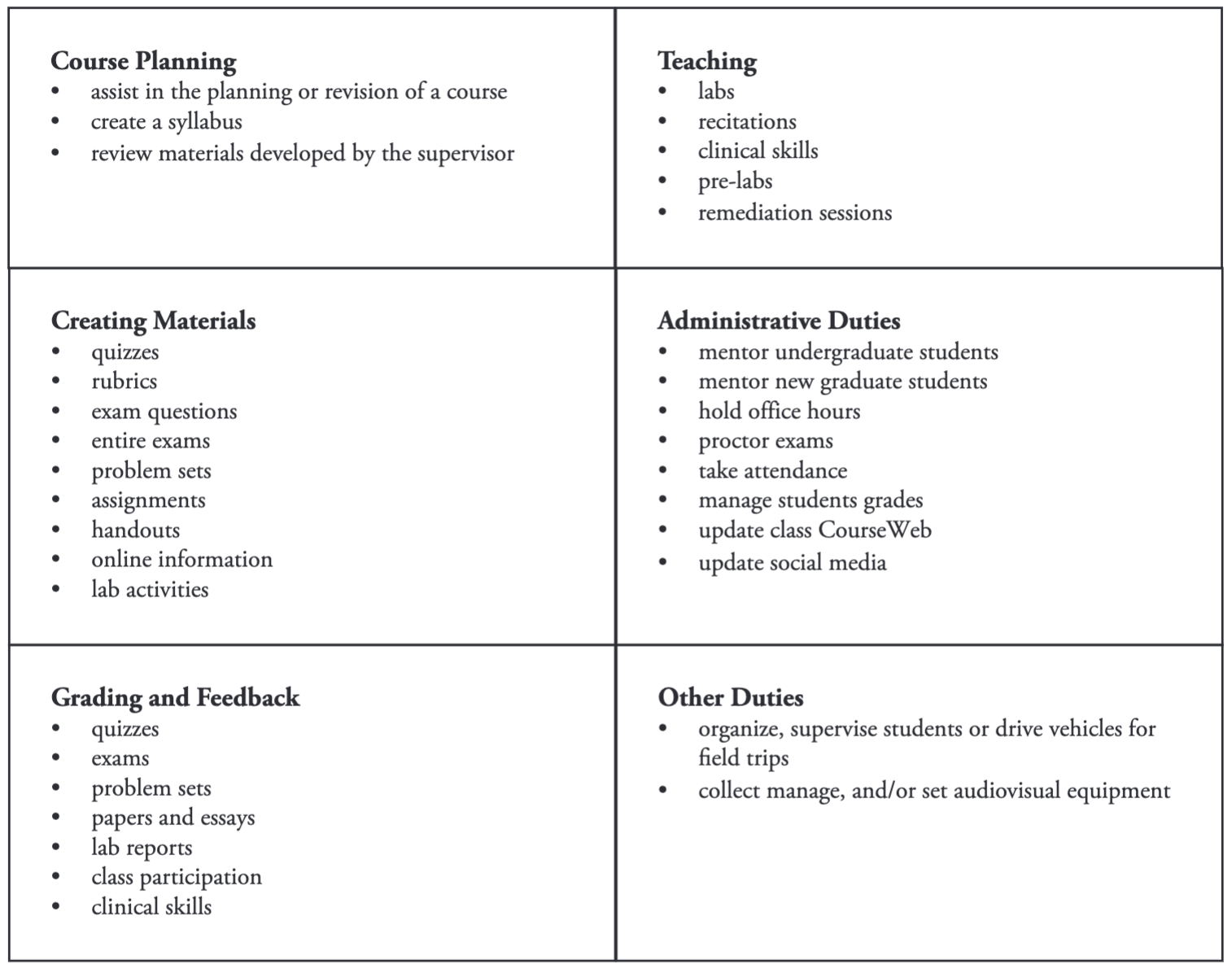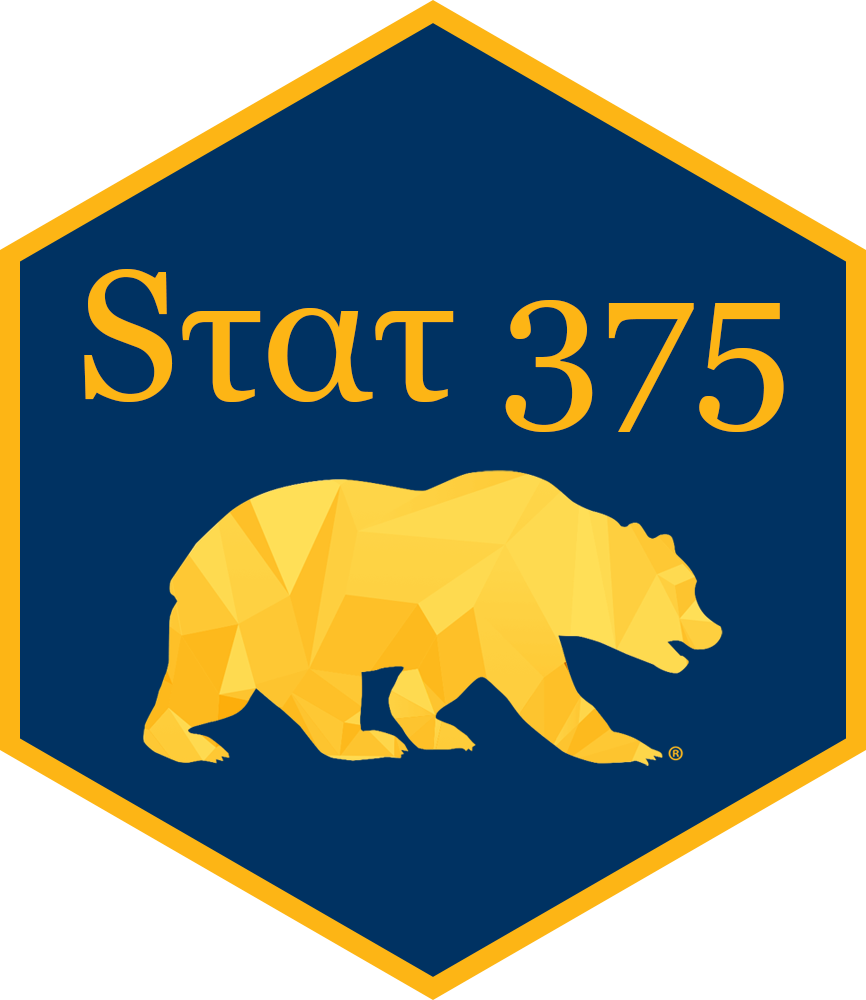10:00
Teaching As a Team
STAT 375 UC Berkeley
Welcome to STAT 375
As you come in, be sure to sign in, then please sit next to people who teach a different sort of class than you.
Reintroductions
Please tell us your name, year, major, and class you’re teaching.
Agenda
- Reflections
- Teaching as a Team
Your role
Members of a team at Cal
Teaming well and not so well
Suggestions for success
Reflections from teaching
Reflections from teaching
In your groups, take turns sharing:
- What class you’re teaching
- One thing that went well
- One thing that went poorly
- One thing you learned
Teaching as a Team
The Role of a GSI: The GSI Perspective
Beyond facilitating your section, several other roles emerged:
Point of contact: Link between student and rest of course
Content Creator: Write lesson plans, questions, rubrics
Operations: Course infrastructure, grading
Inspirer: Keep students engaged and motivated
Decide which one of these you most identify with.
Discuss
With your group, take turns sharing:
Your primary and secondary roles, as you understand them to be.
What two activities you spend the most time doing as part of your role.
Was there agreement or contrast in how your instructor views your role?
08:00
Members of the Teaching Team at Cal
Members of the Teaching Team at Cal
- Instructor
- GSI / uGSI
- Reader
- Tutor
- Academic Intern
Who fills these positions?
What is their role?
Instructor
Who are they?
- Short and long term lecturers, members of the academic senate (professors), adjunct faculty.
Role: Responsible for the content and conduct of a course.
Curriculum: what is taught
Pedagogy: how it’s taught
Course design, policies
Instruction
Course infrastructure
Guiding GSIs
Grading and feedback
DSP accommodations
Academic misconduct
Entering grades
(under) Graduate Student Instructor
Who are they?
- Graduate students or undergraduate students when qualified graduate students cannot be found. May come from different departments.
Role: UC identifies three types:
- Role (a): teaches secondary sections of a larger course. This is the most common type of GSI position.
- Role (b): functions as the instructor of a course in which the curriculum is prescribed, but is responsible for selecting readings, for how the material is presented, and for grading student work. Ex. include language, studio, or Reading and Composition courses.
- Role (c): Head GSI who functions as coordinator of other GSIs and/or performs other teaching or administrative duties.
GSI duties identified by faculty at Pitt:

The Role of a GSI: The Instructor Perspective
“core and main engine of the course”
“create quiz/exam questions”
“in charge of leading section”
“empathize with students”
“instructors’ eyes and ears”
“timely, fair and accurate grading of problem sets”
“My jobs are similar to yours except that I am giving lectures not lab sessions”
No response (most common!)
Reader
Who are they?
- Usually graduate students, but qualified undergrads may be employed when grad students are not available. Professional readers, not enrolled as students, may be employed to meet special needs.
Role
- Render diverse services as course assistants, which will normally include the grading of student papers and examinations. Duties might also include attendance at lectures, office hours, consultation with the instructor, and other course-related duties. Readers may not perform teaching duties.
Tutor
Who are they?
- Usually graduate students, but qualified undergrads may be employed when grad students are not available.
Role
- Render individual or group instructional activities in support of regular academic programs. Under supervision, a Tutor’s duties may include individual tutoring sessions, group tutoring sessions, presentation at workshops, and other duties as assigned. Tutors do not perform teaching duties assigned to the GSI series.
Academic Intern
Who are they?
- Undergraduate students enrolled in a 1 unit course.
Role
Provide support for students in discussion sections, labs, or office hours, supervised by (u)GSIs. Time commitment is 3 hours per week on average. AIs do not receive financial compensation.
Important part of pipeline for (u)GSIs
Teaching as a Team: Well and Poorly
Teaching as a Team: Well
Consider a specific aspect of or incident in your working relationship with your teaching team that has gone well.
Think: write a short description on the padlet.
Pair: share your experience with a partner and discuss.
Share: whole class discussion.
Teaching as a Team: Well
Consider a specific aspect of or incident in your working relationship with your teaching team that has gone well.
1. Think: write a short description on the padlet.

01:30
Teaching as a Team: Well
Consider a specific aspect of or incident in your working relationship with your teaching team that has gone well.
- Think: write a short description on the padlet.
- Pair: share your experience with a partner and discuss.
- Share: whole class discussion.
Teaching as a Team: Poorly
Consider a specific aspect of or incident in your working relationship with your teaching team that has gone poorly or could be improved.
- Think: write a short description on the padlet.
- Pair: share your experience with a partner and discuss.
- Share: whole class discussion.
Teaching as a Team: Poorly
Consider a specific aspect of or incident in your working relationship with your teaching team that has gone poorly or could be improved.
1. Think: write a short description on the padlet.

01:30
Teaching as a Team: Poorly
Consider a specific aspect of or incident in your working relationship with your teaching team that has gone poorly or could be improved.
- Think: write a short description on the padlet.
- Pair: share your experience with a partner and discuss.
- Share: whole class discussion.
Strategies for Success
Suggestions: Communication
Don’t be afraid to ask questions!
Reach out to other staff if you can’t complete a task or don’t know how
Regularly check in with your AIs/tutors/graders
Ensure that you yourself are approachable as well
But don’t forget to set boundaries!
Suggestions: Structure
Responsibilities of team members
Be sure they’re mutually understood
Timelines can help
Meetings inherit existing power dynamics
Make an agenda
Assign roles
Where to seek help
- Head TA
- Instructor
- GSI Advisor
- Department Chair
- Campus Ombuds Office
